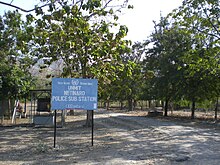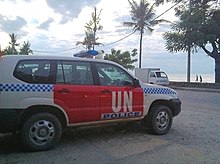United Nations Integrated Mission in Timor-Leste
| UNMIT | |
|---|---|
| operation area | East Timor |
| German name | United Nations Integrated Mission in Timor-Leste |
| English name | United Nations Integrated Mission in Timor-Leste |
| Based on UN resolution | 1704 (2006) |
| Other UN resolutions | 1745 (2007) |
| Beginning | August 25, 2006 |
| The End | December 31, 2012 |
| management | Sukehiro Hasegawa ( Japan ) August 2006 - November 2006 Atul Khare ( India ) December 2006 - December 2009 Ameerah Haq ( Bangladesh ) December 2009 - June 8, 2012 Finn Reske-Nielsen ( Denmark ) June 8, 2012 - December 31, 2012 |
| Operating strength (min.) | 1,100 |
| Operating strength (max.) | 3,174 |
| Military out | Australia , Bangladesh , Brazil , People's Republic of China , Fiji , Malaysia , New Zealand , Pakistan , Philippines , Portugal , Sierra Leone and Singapore |
| Police off | Egypt , Australia, Bangladesh, Brazil, People's Republic of China, El Salvador , Gambia , India , Japan , Yemen , Canada , Croatia , Kyrgyzstan , Malaysia, Namibia , Nepal , New Zealand, Nigeria , Pakistan , Palau , Philippines, Portugal, Romania , Russia , Zambia , Samoa , Sweden , Senegal , Zimbabwe , Singapore , Spain , Sri Lanka , South Korea , Thailand , Turkey , Uganda , Ukraine , Uruguay and Vanuatu |
| Deaths | 1 |
| costs | July 1, 2007–30. June 2008: $ 160.59 million |
| Location of the operational area |

|

The United Nations Integrated Mission in Timor-Leste ( UN Integrated Mission in Timor-Leste UNMIT ) is the follow-up mission of the UNOTIL ( UN Office in Timor-Leste ) of the United Nations in East Timor . According to resolution 1704, it is supposed to restore security, help with economic development and support the holding of the presidential and parliamentary elections scheduled for 2007 . The UN Security Council agreed on the mission on August 25, 2006 after months of fighting between various groups in East Timor , in which more than 37 people were killed and around 155,000 people had fled.
In June 2007, UNMIT consisted of 1,628 police officers, 33 military advisers, 274 international and 938 local civilian employees and 301 UN volunteers. After the elections, the first civilian employees who supported the electoral organization were bid farewell in August. At the end of March 2011, 1,280 police officers and UN staff were still involved in the mission. The mandate of UNMIT was extended one last time on February 24, 2012 to December 31, 2012.
history
At the beginning there were disputes between the UN and Australia as to whether the mission should also become a military component of UNMIT. However, Australia refused to place its troops, which are part of the International Stabilization Force ISF in East Timor , under UN command. Australia also provides the leadership of the ISF. Therefore UNMIT is limited to a police and civil mission. The then East Timorese Prime Minister José Ramos-Horta also rejected a UN military mission as inadequate.
UNMIT began its work on September 13, 2006, the start of the mission was accompanied by a ceremony in the Timorese capital Dili . After the ceremony, Prime Minister Ramos-Horta announced his resignation if militias and opposition groups continue to violently oppose the government. A few hours after the start of the UN mission, rival gangs fired arrows at each other near the presidential palace in the evening. A 19 year old was killed. Around 60 Portuguese soldiers, the international reaction force active in East Timor since the end of May, fired rubber bullets to disperse the fighters.
The head of UNMIT was initially the Japanese Sukehiro Hasegawa , who had already headed UNOTIL since 2004. On September 20, 2006, the former President of Cape Verde António Mascarenhas Monteiro initially accepted his appointment as Special Representative of the UN Secretary General Kofi Annan for East Timor and was supposed to take over the management of UNMIT from Hasegawa, whose term of office was ending. But on September 25, Monteiro turned down the post on the grounds that some conflicting parties had concerns about him. As a result, on December 6, 2006, the Indian Atul Khare was appointed by Kofi Annan as the new UN special envoy and head of UNMIT. Ameerah Haq from Bangladesh followed on December 4, 2009, followed by Khare as the new special envoy and UNMIT head.

On November 10, 2006, the 55-year-old director of the Philippine National Police Rodolfo Aser Tor was designated as the new police chief of UNMIT. He replaced the Portuguese Antero Lopes . In December 2006 UNMIT had to mourn its only death. One of their interpreters was killed in the street.
In early May 2007, UN officials were accused of sexual abuse. They would visit brothels in Dili regularly, although this was strictly forbidden by the UN administration. The UN employees were also accused of reckless driving. Between March and May, UN employees were involved in 80 traffic accidents, some of them related to alcohol. Although there are no legal regulations regarding drink-driving in East Timor, the UN has issued clear bans on its employees and introduced controls. Four UN drivers have already been caught drunk, three vehicles and two firearms have been confiscated. An internal report on misconduct by UN staff in East Timor over the past few years takes 20 babies out of relationships between UN staff and Timorese women and where fathers abandoned the children. In two cases of sexual abuse, investigations were discontinued due to lack of evidence.
In the context of the attack on February 11, 2008 in Dili , in which President Ramos-Horta was seriously injured, accusations were raised against the UN police that they did not help the injured president quickly. This was rejected by the UN.
On October 13, 2009, it became known that a UN police officer from Zambia was found shot dead in his hotel room.
On March 27, 2011, UNMIT returned full responsibility for internal security to the East Timorese National Police (PNTL).
On June 8, 2012, Finn Reske-Nielsen took over the management of UNMIT from Haq. He led the mission until it ended on December 31st.
On December 31, 2012, the United Nations officially ended the mission. Most of the blue helmet soldiers and logistic staff withdrew. 79 officials remained in the country for additional formalities.
Web links
- UN website of the UNMIT mission ( Memento of August 7, 2009 in the Internet Archive )
- Youtube channel from UNMIT-Video (English)
- UN news
- Wording of UN resolution 1704 on the mandate of the mission (PDF; 47 kB)
Individual evidence
- ↑ UNMIT Homepage ( Memento of August 7, 2009 in the Internet Archive )
- ↑ United Nations Photo, February 24, 2011, Council Extends UN Timor Mission until February 2012
- ↑ a b news, March 27, 2011, E. Timor police take over from UN force
- ↑ un.org: Security Council Extends United Nations Integrated Mission in Timor-Leste for One Year, in Lead-Up to 2012 Parliamentary, Presidential Elections , February 24, 2012
- ↑ Fischer World Almanac 2008
- ↑ Panapress: Ex-President of Cape Verde becomes UN envoy to East Timor , September 21, 2006
- ^ Angola Press, September 27, 2006, Cape Verde: Cape Verde's ex-President declines UN appointment in East Timor. Archived from the original on October 1, 2006 ; Retrieved September 28, 2006 .
- ↑ People's Daily online: Annan appoints Indian as new envoy to Timor-Leste December 7, 2006
- ↑ Topix, December 4, 2009, Ameerah Haq made Head of UNMIT
- ↑ nasdaq.com: Philippine Officer To Head UN Police Force in East Timor November 9, 2006
- ↑ scoop.co.nz: Police Commissioner Appointed In Timor-Leste December 8, 2006
- ↑ theage.com.au: UN turns blind eye to use of Timor brothels May 7, 2007
- ↑ BBC, February 14, 2008, UN East Timor police called "cowards"
- ↑ taiwannews.com.tw, October 13, 2009, UN police officer found shot dead in East Timor
- ^ Diario Nacional: Finn Reske Nielsen replaces Haq , June 8, 2012
- ↑ UN ends after 13 years of peacekeeping in East Timor


